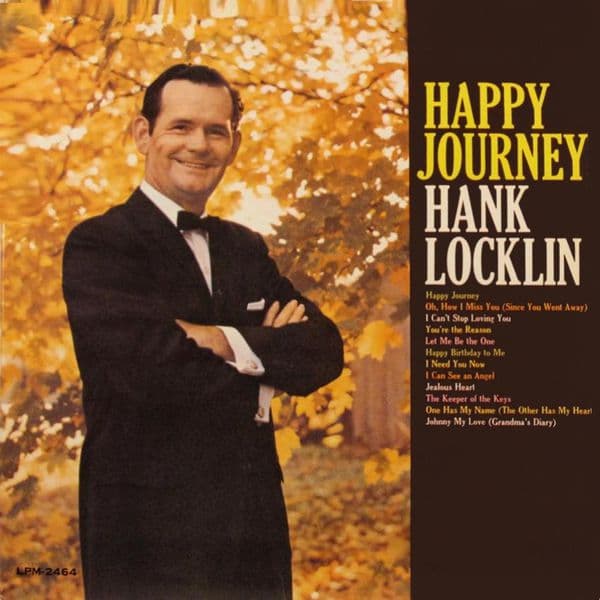
A Wistful Farewell: The Bittersweet Promise of a New Beginning After a Love Has Faded Away
Hank Locklin‘s tender and profoundly melancholic ballad, “Happy Journey”, is a quintessential example of his mastery of the heartbroken country song, infused with a glimmer of dignified resignation. This evocative track was a significant hit for Locklin, reaching an impressive number 4 on the Billboard Hot Country Singles chart in late 1961. Its success was a testament to his smooth, emotive delivery and the song’s incredibly relatable portrayal of a mature, albeit sorrowful, acceptance of an ending. While not a crossover pop hit, “Happy Journey” solidified his reputation as a balladeer capable of conveying deep emotion with a quiet grace, appealing to millions who found solace in his honest portrayal of life’s painful transitions. Featured as the title track on his 1962 album, “Happy Journey” (which also performed well on the country charts), this song became a beloved classic for fans who cherished its raw emotional honesty and its timeless depiction of moving on after a love has quietly departed, leaving a bittersweet farewell.
The story behind “Happy Journey” is rooted in the insightful songwriting talents of R.J. (Bob) Riley, A.L. (Pete) Reynolds, and Gene Autry, the legendary “Singing Cowboy” himself. This collaborative effort produced a lyric that perfectly captures the complex emotions surrounding the amicable, yet deeply painful, dissolution of a relationship. The song’s narrative is a first-person account from a protagonist who is bidding farewell to a loved one, acknowledging that their paths are diverging and that one must embark on a “happy journey” without the other. It’s a poignant moment of letting go, filled with wistful acceptance rather than bitter recrimination. The “happy journey” is not necessarily a joyful one for the speaker, but a hope for the departing loved one, even if it means enduring profound loneliness. It speaks to the maturity of accepting that love, sometimes, just isn’t enough, and that separation, however heartbreaking, might be necessary for one or both parties to find happiness elsewhere. Hank Locklin, with his distinctive smooth tenor and his remarkably empathetic delivery, was the ideal voice to convey this profound sense of quiet resignation and enduring affection. His rendition imbued the song with an undeniable sincerity and a poignant dignity in its suffering, making the listener feel the depth of such a necessary, yet heartbreaking, goodbye.
The meaning of “Happy Journey” is a deeply poignant and gracefully melancholic exploration of a relationship’s amicable yet sorrowful end, embodying a mature acceptance of separation and a bittersweet wish for a departed loved one’s future happiness. It’s a song about the dignity found in letting go, even when it causes profound personal pain, recognizing that diverging paths might be necessary for growth or contentment for one or both individuals. The lyrics convey a powerful sense of resignation, a quiet understanding that love can fade, and a selfless hope that the one leaving will find joy, even if it means facing profound loneliness alone. Lines like “Happy journey, my love, may your journey be fine / Though it takes you away from this broken heart of mine” perfectly capture this blend of well-wishing and personal anguish. It speaks to the universal human experience of enduring the quiet heartbreak of an ending, the strength required to extend goodwill even in sorrow, and the profound grace found in accepting a reality where two paths diverge, leaving behind a legacy of bittersweet memories and a silent, tearful blessing for a “happy journey.”
Hank Locklin‘s vocal performance on “Happy Journey” is a masterclass in understated, yet incredibly effective, emotional delivery. His voice, clear, warm, and imbued with an inherent tenderness, delivers the resigned lyrics with a palpable sense of wistful acceptance, rather than overt anguish. He sings with a quiet dignity, making the listener feel the profound sadness of a man who understands that some goodbyes are inevitable, even if they break the heart. The instrumentation, characteristic of the Nashville Sound of the early 1960s, is subtly elegant and supportive, featuring a beautifully weeping steel guitar that perfectly mirrors the melancholic farewell, a soft piano melody, and a steady, unobtrusive rhythm section that builds a sense of quiet reflection. This clean, unobtrusive production allows Locklin‘s expressive voice and the song’s heartfelt message to take center stage, creating an atmosphere of profound and dignified sorrow. As the title track from his 1962 album, it solidified his versatility as an artist, capable of both passionate declarations and the poignant introspection that defined much of traditional country music.
Listening to “Happy Journey” today evokes a particular kind of profound nostalgia, transporting us back to a golden era of country music when ballads were crafted with such pure, heartfelt emotion and sung with an unmistakable sincerity. It reminds us of Hank Locklin‘s unique gift for embodying resignation and conveying it with a quiet grace that resonates deeply. For those of us who recall its pervasive charm on the airwaves, this song remains a cherished gem, a timeless anthem for the bittersweet pain of an ending and the quiet, courageous act of wishing a loved one well on their way. It’s a melody that, even after all these years, continues to resonate with its poignant truth, gently reminding us that sometimes, the hardest and most loving thing to say is “happy journey.”